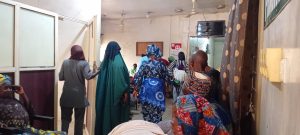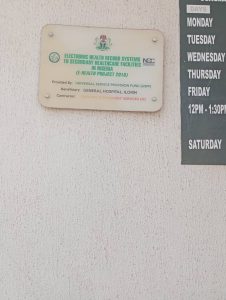By Azeez Adisa-Jaji
Silifat Ahmed, a 39-year-old resident of Adabata, Ilorin, Kwara State, often spends an entire day waiting to see a doctor at Kwara State Teaching Hospital, the nearest healthcare facility to her.
“I’m used to it. I know that if I don’t come early, I won’t be able to see the doctor,” she said. “But it’s not fair. They need to improve their system.”
The delays stem from an outdated manual record-keeping system. Each patient’s file—containing their medical history—is stored in stacks of ageing brown folders, prone to misplacement. A single missing file can derail an appointment, forcing patients to wait indefinitely.
On one occasion, Ms Ahmed left without seeing a doctor.
After waiting three hours, the records office shut its doors at 10:00 a.m., instructing patients to return the next day. Only those in critical condition were allowed to proceed to the emergency unit.
When she returned the following morning, the ordeal continued. It took another two hours before the staff located her file. By the time she was called in, exhaustion had set in.
Her experience is not unique. Across government hospitals in Kwara State—including Specialist Hospital, Sobi, the University of Ilorin Teaching Hospital, and over 500 primary healthcare centres—patients endure similar struggles due to a system trapped in the past.

Photo: Azeez Adisa-Jaji
Zainab Olowo, another patient at Kwara State Teaching Hospital, described the manual records system as “tedious and stressful.”
“Even after waiting in the queue to collect my file, I still have to join another queue for preliminary checks before the file is sent to the doctor’s consulting room,” she explained.
Due to the sheer number of patients, Ms Olowo arrives at the hospital an hour or two before the records office even opens, just to secure a spot.
“I only came for a follow-up after being diagnosed with malaria, yet I still have to go through this long process,” she said.
Another issue is the severe shortage of staff.
“Only two or three personnel are available to search for files, and they start to work around 8:00 a.m.. They call us according to the numbers we pick, and once they reach 100 patients, they stop issuing numbers. Anyone who arrives afterwards is told to come back the next day,” Ms Olowo explained.
Like many others, she wonders why something as simple as retrieving a patient’s medical history should take hours—sometimes days. “It’s frustrating,” Ms Olowo said with a sigh. “If this system were digital, we wouldn’t have to suffer like this.”
When Ganiyat Samad’s, another outpatient at the hospital, file was recently misplaced, she went through a long back-and-forth with hospital staff to open a new file for her. But that came with another problem—her medical history was gone.
“I had to recount whatever I could remember to the doctor,” she said.
For Ganiyat, the solution is clear.
“They need to adopt an Electronic Medical Records (EMR) system,” she said. “That way, I wouldn’t have to go through this every time I visit.”
‘EMR…it is efficient’
Over 300 kilometres away from Kwara, in Lagos State, Fatimoh Baki, a resident of Ikorodu, describes a starkly different experience at the Lagos State General Hospital, Ikorodu.
Since becoming a patient there in October 2024, she has received “seamless healthcare services”, thanks to the hospital’s Electronic Medical Records (EMR) system or Electronic Health Records (EHRs).
Lagos State introduced EMRs in 2013, aiming to streamline hospital workflows, reduce wait times, and improve patient outcomes across its public hospitals.
“This milestone is a major accomplishment for us and promotes patient safety while enhancing their medical care experience,” said Taiwo Hassan, the Chief Medical Director of the Lagos State General Hospital Ikorodu.
The hospital adopted the EMR system in December 2022, and the transformation has been significant, Dr Hassan said.
“Each patient is assigned a unique EMR card with an ID linked to their records,” he explained. “Upon arrival, they simply present the card at reception, where their details are retrieved within seconds.”
This system has reduced waiting times at the records unit.
Previously, locating a physical file could take up to an hour at the hospital. Now, a patient’s medical history is available to the doctor within 10 minutes.
“With automated record-keeping, prescription errors have dropped by 30%, and referrals to specialists are now seamless,” Dr Hassan told Social Voices. “Compared to the previous manual system where files were often misplaced and difficult to find when needed, EMRs have improved operational efficiency by over 50%.”
Doctors now access patient histories directly from their computers during consultations, allowing them to review past treatments, update prescriptions, and provide referrals—all within minutes.
To prevent service disruptions, each desktop is equipped with an Uninterruptible Power Supply (UPS), ensuring doctors can continue attending to patients even during power outages. “The hospital has also transitioned to a solar-powered system, with a generator backup to ensure operations run smoothly at all times,” Dr Hassan added.
How EMRs Can Transform Hospital in Kwara
Research has shown that EMR adoption is linked to improved access to information, increased healthcare professional productivity, and reduced patient waiting times.
Another study of hospitals in Nigeria found that using EMRs improved the accuracy of patient information by 142%, reducing medical errors and enhancing treatment outcomes.
If adopted at Kwara State Teaching Hospital, EMRs could eliminate long waiting times, enable seamless access to patient history, and ensure timely medical attention. Unlike manual records, which are prone to loss, EMRs ensure secure data storage and integrity.
However, despite these benefits, EMRs remain largely unimplemented in Kwara hospitals. Interestingly, an EMR office was commissioned at Kwara State Teaching Hospital in 2016, yet it remains unused nearly nine years later.

Photo: Azeez Adisa-Jaji
Overcoming the Barriers to EMR Adoption
Ibraheem Adeola Katibi, a professor of medicine at the University of Ilorin, has urged the state government to prioritise full EMR implementation. He emphasised that infrastructure deficiencies, such as power outages and unreliable internet connectivity, must be addressed for a smooth transition.
“Hospitals need to invest in solar energy and establish stable internet connections to fully integrate EMRs,” he said.
On financial constraints, he noted that public-private partnerships and increased government funding could provide the necessary resources. “In the long run, this investment will reduce costs by improving efficiency and cutting administrative overhead,” Prof Katibi noted.
To address staff resistance, he stressed the importance of comprehensive digital training programmes: “Many healthcare workers are accustomed to manual record-keeping. Training them in digital systems will boost confidence and improve service delivery.”
Prof Katibi also highlighted data security as a top priority. “Strong cybersecurity protocols—such as encryption, multi-factor authentication, and strict access controls—must be implemented to protect sensitive medical data and foster trust in the system,” he added.
By embracing EMRs, Kwara State could transform its healthcare sector—reducing inefficiencies, improving patient care, and ensuring that no one has to wait hours just to retrieve a file.















